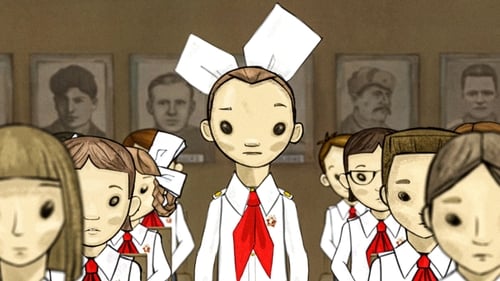
Producer
Ieva has been an obedient granddaughter for years – choosing a safe career in a bank as her grandmother wanted. Her mother left the family years ago when she had to look for work abroad. That has made ties between Ieva and her grandmother especially tight. Dissatisfaction with the constant adaption to the material world is flickering under the surface and Ieva lives her dreamlife with her friends. She plays the keyboard in a girl band and stays out late. When Ieva decides to have a provocative tattoo on her arm made, her grandmother goes completely nuts.

Character Voice (voice)
라트비아의 현대사를 개인적 경험에 녹여 설득력 있게 보여주는 애니메이션. 소련 치하에서 공산주의 교육을 받으며 자란 소녀는 누구보다 모범적인 학생이 되려 한다. 학교에서 하라는 대로 잘 따르며 누구보다 앞장서는 학생 대표를 꿈꾼다. TV에선 늘 독일 나치나 서방 제국주의자들에 맞서는 소련군의 활약을 보여주고 소녀 역시 공산주의 전사가 되고자 한다. 소녀에게 이해가 안 되는 것은 할아버지가 공산주의를 좋아하지 않는다는 것이다. 자신이 사랑하는 사람들이 겪은 일들을 알게 되면서 소녀는 차츰 공산주의로부터 멀어지게 된다. 애니메이션 속에 다큐멘터리처럼 실제 있었던 사건의 화면과 실존 인물들이 등장하는 형식을 취한 작품.

Camera Operator
라트비아의 현대사를 개인적 경험에 녹여 설득력 있게 보여주는 애니메이션. 소련 치하에서 공산주의 교육을 받으며 자란 소녀는 누구보다 모범적인 학생이 되려 한다. 학교에서 하라는 대로 잘 따르며 누구보다 앞장서는 학생 대표를 꿈꾼다. TV에선 늘 독일 나치나 서방 제국주의자들에 맞서는 소련군의 활약을 보여주고 소녀 역시 공산주의 전사가 되고자 한다. 소녀에게 이해가 안 되는 것은 할아버지가 공산주의를 좋아하지 않는다는 것이다. 자신이 사랑하는 사람들이 겪은 일들을 알게 되면서 소녀는 차츰 공산주의로부터 멀어지게 된다. 애니메이션 속에 다큐멘터리처럼 실제 있었던 사건의 화면과 실존 인물들이 등장하는 형식을 취한 작품.

Animation Director
라트비아의 현대사를 개인적 경험에 녹여 설득력 있게 보여주는 애니메이션. 소련 치하에서 공산주의 교육을 받으며 자란 소녀는 누구보다 모범적인 학생이 되려 한다. 학교에서 하라는 대로 잘 따르며 누구보다 앞장서는 학생 대표를 꿈꾼다. TV에선 늘 독일 나치나 서방 제국주의자들에 맞서는 소련군의 활약을 보여주고 소녀 역시 공산주의 전사가 되고자 한다. 소녀에게 이해가 안 되는 것은 할아버지가 공산주의를 좋아하지 않는다는 것이다. 자신이 사랑하는 사람들이 겪은 일들을 알게 되면서 소녀는 차츰 공산주의로부터 멀어지게 된다. 애니메이션 속에 다큐멘터리처럼 실제 있었던 사건의 화면과 실존 인물들이 등장하는 형식을 취한 작품.

Producer
라트비아의 현대사를 개인적 경험에 녹여 설득력 있게 보여주는 애니메이션. 소련 치하에서 공산주의 교육을 받으며 자란 소녀는 누구보다 모범적인 학생이 되려 한다. 학교에서 하라는 대로 잘 따르며 누구보다 앞장서는 학생 대표를 꿈꾼다. TV에선 늘 독일 나치나 서방 제국주의자들에 맞서는 소련군의 활약을 보여주고 소녀 역시 공산주의 전사가 되고자 한다. 소녀에게 이해가 안 되는 것은 할아버지가 공산주의를 좋아하지 않는다는 것이다. 자신이 사랑하는 사람들이 겪은 일들을 알게 되면서 소녀는 차츰 공산주의로부터 멀어지게 된다. 애니메이션 속에 다큐멘터리처럼 실제 있었던 사건의 화면과 실존 인물들이 등장하는 형식을 취한 작품.

Producer
A documentary about two 13-year-old girls, both obsessed with fashion and developing their personal style. One of the girls lives in a small town in Latvia, the other one - in Norway. How do their surroundings influence their acts of self-expression? And how do their mothers cope with the idea that their little daughters are becoming adults?

Editor
For the post-war generation in Latvia, the dream of the “good old days” became a significant part of the process of regaining independence. The dream of restoring the countryside to the way it was during the first independence is only now seen by most as naïve and unreal. Six episodes that reflect the historical development in the nation parallel to the fate of the director’s mother are used to explore the effects of political order on everyday lives. Though she is now leaving the countryside, the process of moving her life provides a visual stimulus for memories.

Producer
For the post-war generation in Latvia, the dream of the “good old days” became a significant part of the process of regaining independence. The dream of restoring the countryside to the way it was during the first independence is only now seen by most as naïve and unreal. Six episodes that reflect the historical development in the nation parallel to the fate of the director’s mother are used to explore the effects of political order on everyday lives. Though she is now leaving the countryside, the process of moving her life provides a visual stimulus for memories.

Director of Photography
For the post-war generation in Latvia, the dream of the “good old days” became a significant part of the process of regaining independence. The dream of restoring the countryside to the way it was during the first independence is only now seen by most as naïve and unreal. Six episodes that reflect the historical development in the nation parallel to the fate of the director’s mother are used to explore the effects of political order on everyday lives. Though she is now leaving the countryside, the process of moving her life provides a visual stimulus for memories.

Camera Operator
Actress Indra Burkovska tells the story of her father Aleksandrs and his large family, and life on the farm through the 20th century when the farmer was both a master and a slave to his land. Aleksandrs presents a gift to the Ethnographic Open Air Museum that was his life’s dream – a threshing machine Imanta.









